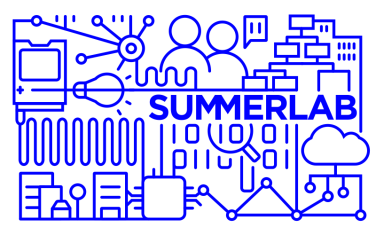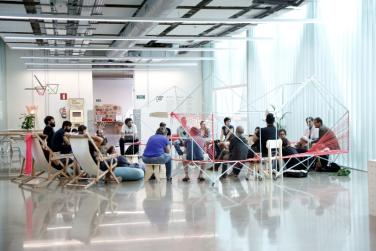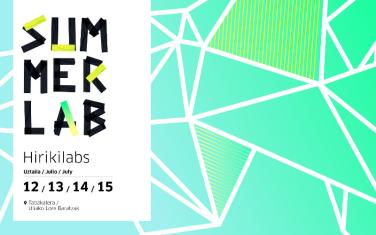SummerLab es un campamento tecnológico en torno a temas como la investigación medioambiental ciudadana, la apertura de los datos públicos, la privacidad en la red o la gastronomía desde una perspectiva hacker.


SummerLab is a summer camp, a temporary cooperative meeting to look at themes related to technology, digital culture, open design and common learning, which aims to bring together local, national and international initiatives in these areas.
The third edition of the technological camp will bring together curious citizens, technology activists and people from the field of research in an event that will have citizen research as its central theme dealing with issues such as citizen environmental research, the opening up of public data, privacy on the Web and gastronomy from a hacker perspective.
SummerLab 2018 will focus on citizen research as a way of carrying out initiatives and projects in cultural, creative and laboratory spaces, but also as a way to create a civic and participatory culture. Research is the process that is necessary for obtaining knowledge, and its implementation by groups and citizens is a way of building knowledge in different initiatives related to learning that can range from forms of activism to processes of collective empowerment. Who doesn’t have a question to which they would like to be able to provide a better answer based on data or evidence? .
During the event we will learn about different citizen research experiences, understand the ways through which these obtain information, how they work with it and the results obtained through this type of collective practice.
The research processes carried out by various citizens’ initiatives will be the central focus of this event that will combine a space for the development of projects by several working groups with workshops, talks and seminars open to the public.
Working groups and open workshops
The operation of the SummerLab is divided into two parts with different dynamics. The first, which has an open character, takes place in the morning and its objective is to develop projects as a community. The work groups formed by people or groups and supported by some of the guests invited as speakers or experts in the activities can be organised as project development groups, as hubs for discussion or as spaces for experimentation.
In the part with the second dynamic, in the afternoons, a programme of public activities will be offered that includes talks, workshops and seminars. The objective is that combining these two dynamics will favour the creation of new common projects, aided also by the collaboration and the remixing of themes and people.
One of the main aims of Hirikilabs in these meetings is also to create opportunities to show people what is being explored or what experiments are being carried out in their community and in the laboratory programmes, giving them an opportunity to mix initiatives with different origins and create intensive collaborations.
Thematic focuses
The event will involve the participation of several working groups, some of them already active in Hirikilabs and others formed by people and groups who are carrying out research in different initiatives and cities, who will have a working space with the aim of taking their work further and presenting it to the public. They may also undertake the challenge of carrying out a project (prototypes, possible formation of new networks, mixing between groups) during the days covered by the SummerLab. Each of the groups will propose a series of activities aimed at the public to showcase their work and create spaces for dissemination or moments of dialogue on the specific topics on which they are working. Each of the activities will have a registration form.
GAIMeC is a group that arose from the collaboration between Hangar, IMVEC (Institute for Monitoring and Surveillance of Contaminated Areas) and Hirikilabs, meets periodically in a virtual way to address issues related to polluted environments, citizen science, nature and its evolution. In their meetings they have worked on visual architecture, online security, design and prototyping of projects with free hardware and citizen environmental research, among many other topics, undertaking activities such as a workshop to carry out mud sampling in the Urumea River and different tests to measure odours in potentially polluted areas.
The group will meet to share ideas and carry out further work on the projects during the year, inviting anyone interested in citizen environmental research to participate, since this is an open platform to both learn and enjoy working with the people who come to the meeting.
The group will also propose several public activities:
-
Workshop on photography with balloons
-
Mapping workshop with Minetest
-
Water conductivity sensor workshop - Niñes
-
Screening of the documentary Thecolorsmountain.org
Data Commons Lab is a working group involving both production and debate based on the analysis and visualisation of data that has been meeting in Hirikilabs since the beginning of 2018 and that collaborates in the development of a line of the laboratory’s public activities together with the Montera34 collective. The group continues the work with data started in several workshops in Hirikilabs during 2016 and 2017 and serves as a place for reflection on data as a common good that must be cared for and managed jointly by citizens, the authorities and the private sector, and that must sometimes be freed or protected from enclosures or other types of appropriation. One of the objectives as a group is to learn by doing, in order to understand complex realities in the most objective and rigorous way possible.
During the Summerlab’18 Data Commons Lab proposes to form an open working group that aims to bring together people with diverse interests and knowledge about information, data and its visualisation and who will establish the group’s dynamics, themes and ways of organising during the meeting. The meeting will serve to give continuity, with personal attendance, to the dynamics of the Data Commons Lab.
Activities proposed by the group:
- Meeting: Citizen data observatory
What are the official channels and procedures for a citizen to request data from the authorities in Donostia and the Basque Country? And in other cities? Do we need to open up new channels between the citizens and the authorities? Can citizens participate in the management of their city’s data, as well as being able to consult this information? Who decides what is published and what is not published?
Within the Summerlab’18, the Montera34 group proposes a meeting based on the idea of data management as a common good, shared between the citizens and the authorities. In order to do this, we want to create a platform for exchanges between different actors and initiatives:
-
Civio Foundation. Your right to know
-
Bilbao Data Lab
-
Open Knowledge Foundation
The aim of the meeting is to share initiatives in progress, needs, tools to see issues that are common to the situations in different territories, and the possibility of sharing resources, data and tools.
- Open workshop on production with data
The Montera34 group also proposes a work area where projects already started or at an advanced stage, or simply ideas, can be brought in an attempt to give them a collective push. In the working group of the Data Commons Lab there are several projects and ideas in progress. You can either join these or bring something new.
The Very Private Group is a group formed by people who are concerned about privacy and who, through dissemination and awareness-raising projects, attempt to get society interested in the consequences of the data economy and of the espionage to which we are subjected when using the Internet. Our first project, Trackula, generates a view of your trail on the Internet. In the SummerLab, we will take the metaphor to the real world.
Activities proposed by the group:
-
Cookifying the Real World: will be a project-workshop in which we will physically experience the reality of our Internet interactions, observing their implications regarding our privacy.
-
Digital self-protection tools: In this talk we will discuss the tools and technology that you can use to try to improve your online privacy. The idea is that you can bring your computer and leave with your privacy established.
After the talk “Who owns our data?” (05/06/2018) a number of possible issues will be raised and perhaps even the proposal to collaborate with other speakers who have talked about the forms of distraction and seduction of the major platforms.
-
We propose first to carry out an exercise to visualise the monitoring that can be done from routers etc. within Tabakalera and follow this up with its actual visualisation.
-
Workshop on self-protection tools: People have expressed concern about how to protect themselves. This is something that is simple but often forgotten. In this two-hour workshop we find out about tools and alternatives.
This is an experimentation, prototyping and manufacturing hub built around creative design to work with functionally diverse people on an artistic discipline or with artists who wish to use it to reflect and experiment. It seeks a final result that is physical (whatever is prototyped), accompanied by documentation that contextualises the prototype; and if it also results in a performance, so much the better. The important thing about the dynamics is not to remain in the conceptual plane, but that something materialises in the workshop. We are not looking for grand prototypes, but powerful ideas and decent physical approximations.
Activities proposed by the group:
-
Open talk and discussion of prototyping ideas.
-
Prototyping and experimentation + dynamics or body workshop.
Food Hack Lab is a laboratory created with the aim of finding solutions for the agri-food sector using a maker approach. It is a meeting place for people with diverse interests, and it proposes to research and develop technologies and products using Free Technologies and Open Knowledge. Our typical activity includes the design and manufacture of machines, products and processes, the organisation of events and the editing and publication of content with the aim of spreading knowledge.
Food Hack Lab is a non-profit association whose activities take place mainly in the Hirikilabs citizen laboratory in Tabakalera (Donostia/San Sebastian) and it emerged as an open group as an initiative of participants in this meeting point.
Activities proposed by the group:
-
DIY fermenting workshop
Refugeoly is a game based on Monopoly in which players are refugees trying to reach a place of asylum. The game has been designed with the help and testimonies of refugees in Greece and Turkey. This is an educational project and also aims to raise awareness about the hard journey of these people in transit and what is a desperate situation.
